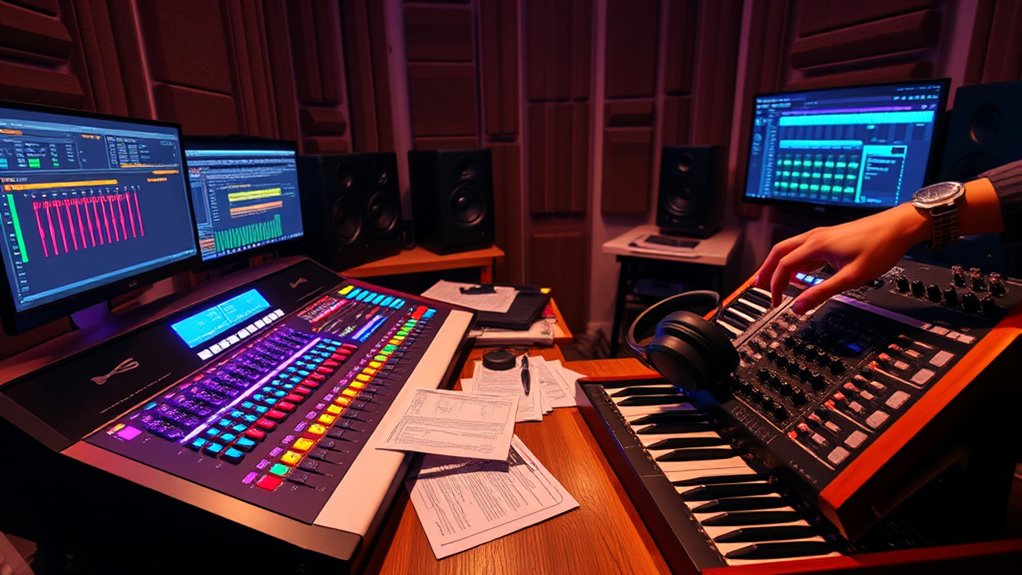As a music producer, your day involves reviewing song ideas, working in the studio to craft sounds, layering instruments, and adjusting mixes. You troubleshoot technical issues, operate studio equipment, and collaborate with artists to bring out their best performances. You also handle licensing, organize your workflow, and stay updated on industry trends. If you want a clearer picture of what a typical day looks like, keep exploring how you can balance creativity with technical and administrative tasks.
Key Takeaways
- Review and develop song ideas, including sound design, mixing, and editing to shape the overall track.
- Manage licensing tasks by securing rights, clear samples, and maintaining documentation to ensure legal compliance.
- Operate studio equipment, record sessions, and troubleshoot technical issues to maintain smooth production workflows.
- Collaborate with artists, provide feedback, and guide performances to enhance the quality of recordings.
- Stay organized with workflow management, prepare tracks for mastering, and keep up with industry trends and networking.

A music producer’s day is a dynamic blend of creative and technical tasks that keep a project moving forward. From early morning, you might be reviewing song ideas or sketches, thinking about how to shape the sound. One of your primary responsibilities is managing music licensing, which involves ensuring all the necessary rights are secured for the tracks you’re working on. You need to verify that the samples, melodies, or any borrowed elements are legally cleared, avoiding potential legal issues down the line. This process requires staying organized and in constant communication with rights holders, publishers, or licensing agencies. It’s essential because it impacts the commercial release and distribution of the music, and you want to make sure everything is above board.
Throughout your day, you spend a significant amount of time in the studio, working with your studio equipment to craft the perfect sound. Your studio setup might include a digital audio workstation (DAW), high-quality microphones, MIDI controllers, audio interfaces, and speakers or headphones. You use this equipment to record, edit, and mix tracks, constantly tweaking sounds to achieve your artistic vision. Whether you’re layering synths, adjusting EQ, or adding effects, you’re actively shaping the sonic landscape of the project. You might also be troubleshooting technical issues—like fixing latency problems or resolving software glitches—to keep the recording process smooth. Your familiarity with your studio gear allows you to work efficiently and creatively, making quick decisions that influence the overall quality of the music.
In addition to technical work, you spend time collaborating with artists, songwriters, or other producers. This involves giving feedback, suggesting changes, or guiding performances during recording sessions. Your ability to communicate clearly and inspire confidence is key; your goal is to bring out the best in everyone involved. You also dedicate time to researching new trends, plugins, or production techniques, always looking for ways to innovate and improve your craft. Sometimes, you handle administrative tasks like scheduling sessions, managing budgets, or coordinating licensing agreements for samples and covers. These responsibilities might not be glamorous, but they’re indispensable for keeping the project on track.
Furthermore, staying updated on hackathons and other industry events can provide opportunities to learn new skills and network with peers, which can be beneficial for a producer looking to stay at the forefront of innovation. Your day often concludes with reviewing your work, bouncing mixes, or preparing tracks for mastering. You may also revisit licensing documentation or seek new permissions to clear any remaining samples. Staying organized and maintaining your studio equipment ensures your workflow remains efficient. Whether you’re in the studio fine-tuning sounds or managing legalities, your day as a music producer is about balancing creativity with precision, always pushing toward the next great track.
Frequently Asked Questions
How Does a Music Producer Choose the Right Artists to Work With?
You choose the right artists by evaluating artist compatibility and genre selection. You look for artists whose style and vision align with your project, ensuring a good creative fit. You listen to their previous work, gauge their passion, and consider their potential for growth. Trust your instincts and industry knowledge to identify artists who can elevate your project, creating a dynamic collaboration that benefits both parties.
What Skills Are Essential for Success as a Music Producer?
Think of yourself as a master chef, blending ingredients to create the perfect dish. Essential skills for success include a solid grasp of music theory to craft harmonious melodies and expert audio engineering to refine sound quality. You need creativity to innovate, technical knowledge to troubleshoot, and communication to collaborate. These skills help you shape raw ideas into polished tracks, transforming simple concepts into compelling musical experiences.
How Do Music Producers Stay Current With Industry Trends?
You stay current with industry trends by actively engaging in music industry networking and leveraging social media engagement. Attend industry events, workshops, and connect with fellow producers and artists online. Follow trending artists, producers, and music platforms on social media to spot emerging styles and technologies. Regularly explore new genres and tools, and participate in online forums, ensuring you stay ahead in the ever-evolving music scene.
What Software Tools Are Most Commonly Used in Music Production?
You typically use music software like Ableton Live, FL Studio, or Logic Pro, which are industry standards. Digital plugins enhance your sounds, offering effects, virtual instruments, and mixing tools that help shape your tracks. These tools are essential for creating, editing, and mixing music efficiently. Staying updated with new software releases and plugins guarantees you keep your productions fresh and competitive in the industry.
How Does a Producer Balance Creative Vision With Commercial Goals?
You strike a balance by staying true to your artistic integrity while keeping an eye on commercial viability. Think of it as walking a tightrope—you need to walk that line carefully, blending your creative vision with market trends. You make intentional choices, ensuring your music remains authentic yet appealing to a broader audience. This way, you maintain artistic credibility while also achieving commercial success.
Conclusion
So, next time you hear your favorite song, remember, a music producer is the secret magician behind the scenes. They craft, refine, and breathe life into every track, turning raw ideas into musical masterpieces. Just as a painter sees colors before they appear on the canvas, a producer envisions the final sound from the start. Without them, the symphony of your favorite tunes would remain just a dream—silent, unspoken, incomplete.









